Key takeaways:
- Culinary adventures enhance cultural appreciation and create connections through shared meals and experiences.
- Travel influences food businesses by inspiring innovation and encouraging the use of local ingredients and cultural exchanges.
- Effective communication and cultural competence are essential when navigating culinary experiences in diverse settings.
- Preparation, openness to local customs, and willingness to experiment are crucial for successful food exploration.
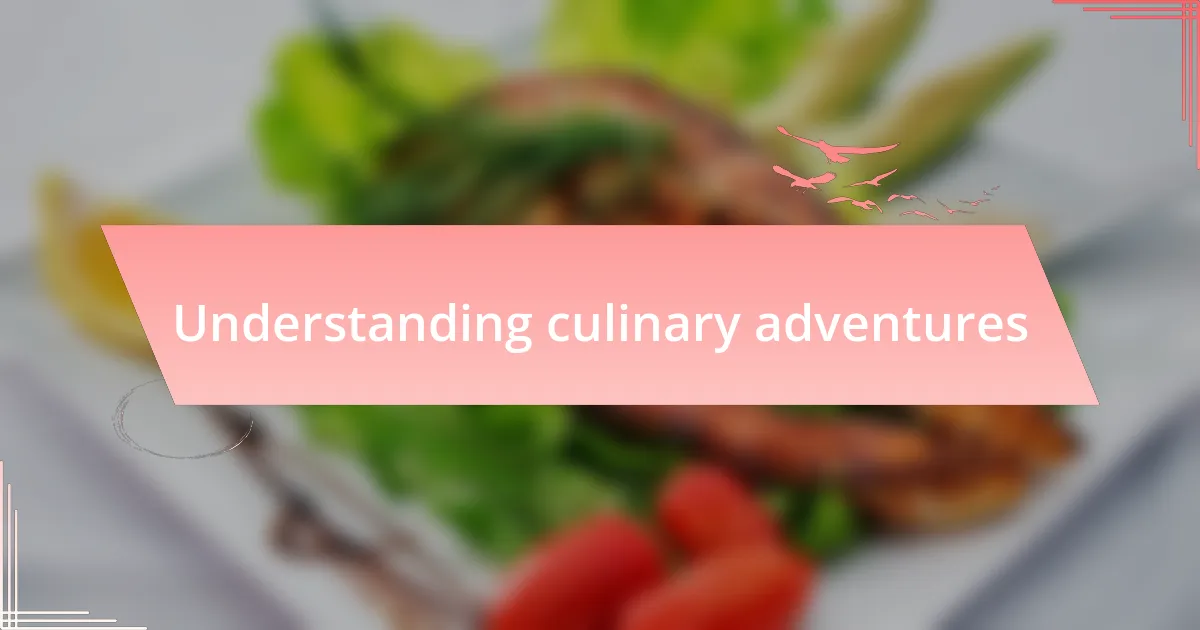
Understanding culinary adventures
Culinary adventures go beyond just tasting food; they are about immersing yourself in the culture behind each dish. I remember the first time I tried street food in Bangkok. The savory aroma of grilled skewers mingled with the sweetness of coconut milk transported me to a bustling market where each bite felt like a celebration. Can you recall a time when food completely shifted your perspective on a place?
When I think of culinary adventures, I reflect on the way they challenge our palate and expand our understanding of global cuisines. For instance, my experience with Moroccan tagine was eye-opening; the blend of spices and stewed flavors was unlike anything I had cooked before. It made me curious—what ingredients or techniques from other cultures have yet to find their way into my kitchen?
Ultimately, these adventures spark a joy that transcends taste alone. Every meal can tell a story, bridging gaps between people and places. I often find myself laughing with locals over shared meals, realizing that food is a powerful connector. Have you ever felt that connection when breaking bread with someone from a different background?
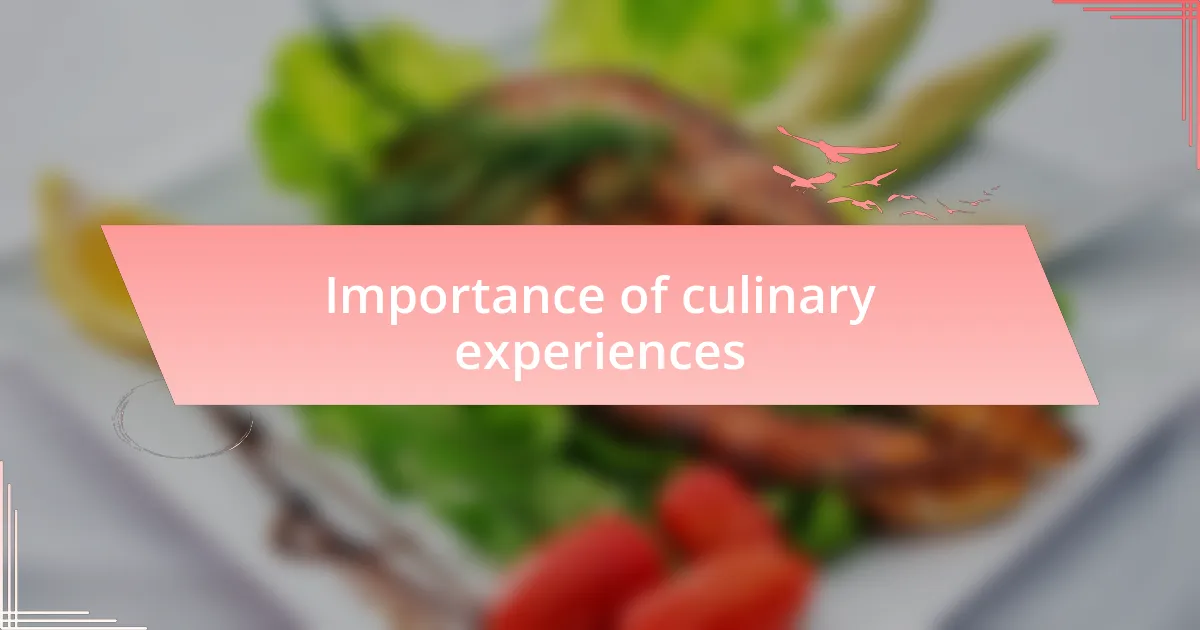
Importance of culinary experiences
Engaging in culinary experiences is vital because they deepen our appreciation of food as an art form and a cultural narrative. I remember attending a traditional Italian cooking class in Tuscany, where the instructor passionately shared stories about each ingredient. The lesson wasn’t just about making pasta; it was about understanding the region’s history and traditions. Have you ever realized how food is intertwined with identity?
Moreover, these experiences can enhance our skills and inspire creativity in our own cooking practices. After savoring the delicate nuances of French cuisine at a cozy bistro in Paris, I attempted to replicate a dish at home. While my attempt fell short, the process taught me valuable techniques and ignited a desire to experiment with flavors. Haven’t you ever tried to recreate a dish that caught your attention while traveling?
Finally, culinary adventures can significantly impact our well-being by encouraging mindfulness and gratitude. During a sunset dinner in a small seaside town, I felt a profound sense of contentment as I savored each bite of freshly caught fish. It reminded me to appreciate life’s simple pleasures, not just the food on my plate but the connections made around the table. How often do we take a moment to be truly present while eating?
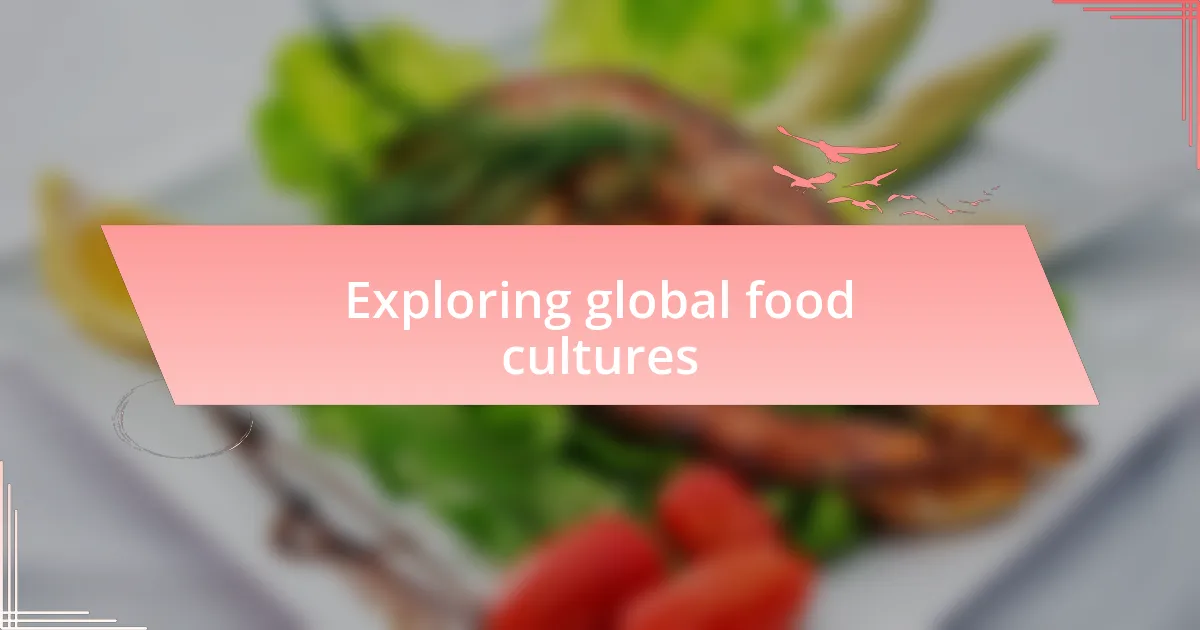
Exploring global food cultures
Exploring global food cultures reveals an incredible tapestry of flavors and traditions. I distinctly remember my first encounter with street food in Bangkok; the vibrant colors and intoxicating aromas were overwhelming. Each dish seemed to tell a story, and the bustling atmosphere drew me in. Can you imagine the energy as I watched a vendor expertly flip Pad Thai right before my eyes?
Venturing into food markets around the world has been eye-opening. In Marrakech, I wandered through the souks, mesmerized by the spices that painted the stalls with vivid hues. The sellers were not just merchants; they were custodians of recipes passed down through generations. It made me ponder, how often do we appreciate the heritage behind what we eat?
Sharing meals in diverse cultures is equally enlightening. I once participated in a family-style dinner in a small village in Greece, where locals welcomed me with open arms and warm plates of moussaka. I felt an immediate connection, transcending language barriers—a sense of belonging. Isn’t it fascinating how food can unite people from different backgrounds, creating bonds that last a lifetime?

How travel influences food businesses
Travel has a remarkable ability to inspire innovation within food businesses. During my time in Italy, I was captivated by how local chefs incorporated seasonal ingredients into their menus, adapting dishes to highlight what was fresh and available. This experience made me realize that sustainability could be a key selling point for restaurants, allowing them to draw in customers who prioritize eco-friendly practices.
I vividly remember visiting a small café in Lisbon where the owner had transformed traditional pastries into modern interpretations. Each bite was a unique blend of nostalgia and creativity, inspiring me to think about my own culinary ventures. How can food businesses harness the influence of travel to reinvigorate familiar dishes? The answer lies in exploration and adaptation, drawing from experiences abroad to create something fresh and exciting.
The connections I forged with local chefs during my travels have also opened my eyes to new business collaborations. While attending a cooking class in Thailand, I met a passionate chef who shared her family’s secret recipes. We discussed how food businesses could benefit from cultural exchanges, blending techniques and flavors. This interplay not only broadens a menu’s appeal but also tells a richer story, inviting patrons to embark on a journey with each dish they sample.
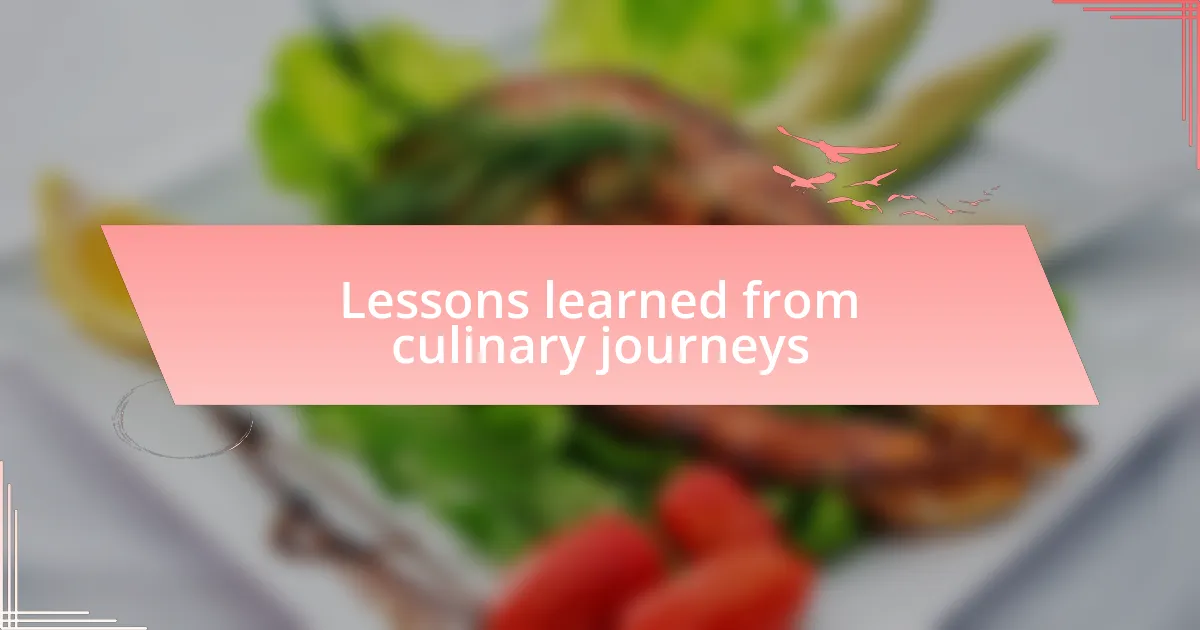
Lessons learned from culinary journeys
Culinary journeys have taught me the value of resilience and adaptability in the food business. While wandering through bustling markets in Bangkok, I encountered vendors quickly shifting their offerings based on the day’s fresh produce. Their ability to embrace change reminded me that flexibility is crucial for thriving in a dynamic industry. Have you ever faced a sudden shift in consumer preferences? It’s through these experiences that I learned to pivot my own menu to keep pace with what diners desire.
One lesson that stands out is the power of storytelling through food. I participated in a cooking workshop in Morocco, where every dish came with a rich history. As I prepared a tagine alongside local chefs, I felt the importance of sharing a dish’s heritage. It made me understand that food isn’t just about taste; it’s about connection. How can restaurants convey such narratives on their menus? My experience has shown that infusing local stories into each plate can create deeper ties with patrons, turning diners into emotionally invested guests.
Traveling has also deepened my appreciation for community and collaboration. I remember visiting a vineyard in France, where the winemaker emphasized the symbiosis between flavors and local cuisine. This reminded me that our culinary adventures are not just personal; they’re woven into the fabric of a community. How can we amplify this sense of belonging in our own businesses? Building partnerships with local farmers and artisans has enriched my offerings, creating a sense of unity that resonates with customers.
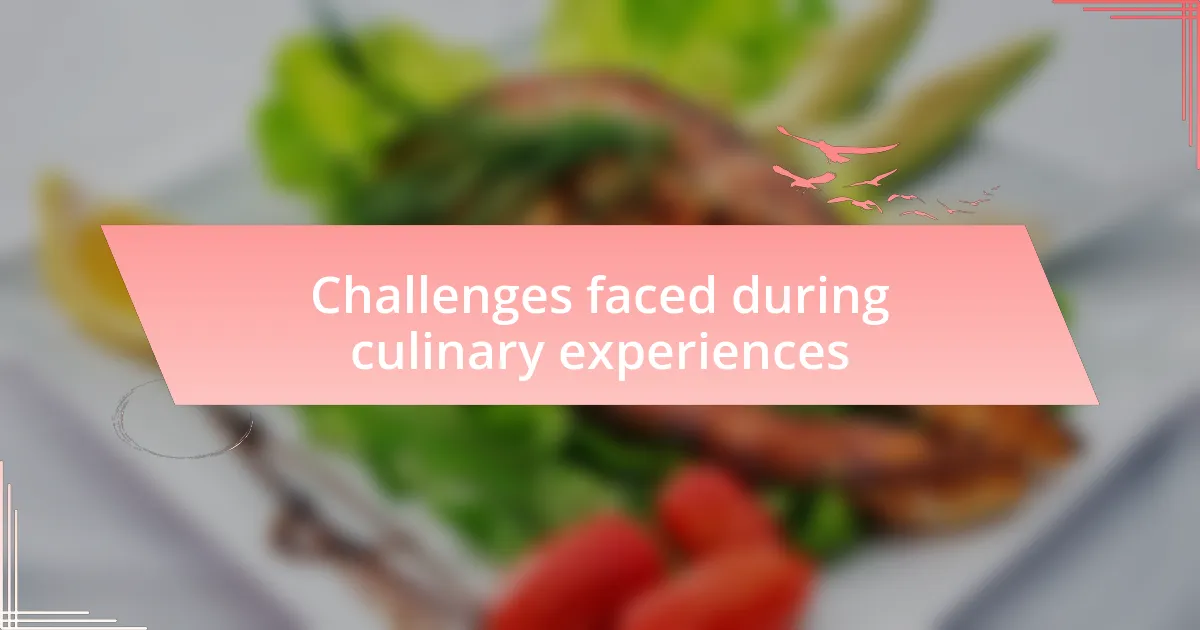
Challenges faced during culinary experiences
Navigating culinary experiences abroad is often riddled with unforeseen challenges. I vividly recall a trip to Italy where a language barrier left me bewildered at a local trattoria. Unable to communicate my dietary restrictions, I hesitated, unsure whether I would end up with a dish that could potentially make me unwell. This encounter taught me that effective communication is vital in the food industry, especially when authenticity is at play. How do we ensure that we address customer needs when language and cultural nuances are at play?
Another challenge I faced involved sourcing ingredients while venturing through spice markets in India. The vibrant chaos was intoxicating, yet I quickly learned that not all spices were created equal. One vendor offered me a blend that looked enticing, but once in my dish, its overpowering flavor made me second-guess my choices. This experience reinforced the importance of understanding local sourcing practices and flavor profiles. Have you ever questioned whether a certain ingredient would truly work in your culinary creations? It’s a constant balancing act of experimentation and knowledge.
Culinary adventures also exposed me to unexpected dining protocols that vary widely from culture to culture. During a meal in Japan, a host’s insistence on the proper way to eat sushi caught me off guard. I felt self-conscious as I fumbled with chopsticks, overshadowing my enjoyment of the food. Moments like these emphasize the significance of cultural competence in the food business. How do we as culinary professionals equip ourselves and our teams to handle cultural intricacies? Building awareness and respect for diverse dining customs can create a welcoming atmosphere for all guests.

Tips for successful food adventures
When embarking on culinary adventures, preparation is key. I once arrived in Thailand without having researched local ingredients or dishes, which left me overwhelmed at the markets. I felt like a fish out of water, standing amid fragrant stalls but unsure of what to sample or ask for. Reflecting on that experience, I learned that familiarizing yourself with a region’s culinary landscape is a surefire way to enhance your adventures. Have you considered how a little background knowledge could transform your food exploration?
Another vital tip is to embrace the local customs and dining etiquette. During a visit to Morocco, I was invited to a traditional meal where everyone shared from a single platter. Initially, I hesitated, unsure of the norms around etiquette and shared eating. But once I surrendered to the experience, I found it to be a beautiful way to connect with those around me. How often do we miss out on authentic experiences simply because we’re hesitant to step out of our comfort zone?
Lastly, I encourage you to keep an open mind and be willing to experiment. While in Mexico, I once accidentally ordered a dish that included ingredients I had never tried before. At first, I was apprehensive, but each bite opened my palate to new possibilities. This taught me that sometimes the best culinary adventures arise from embracing the unknown. Are you ready to step outside your culinary comfort zone?